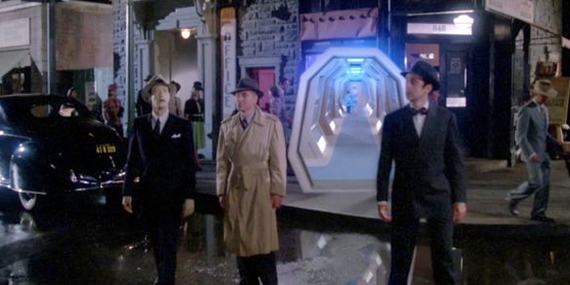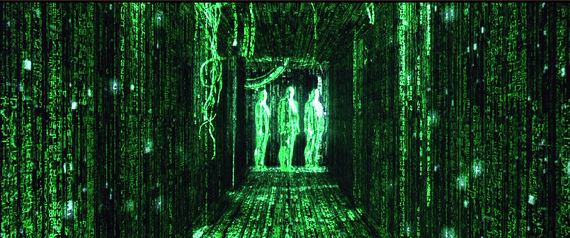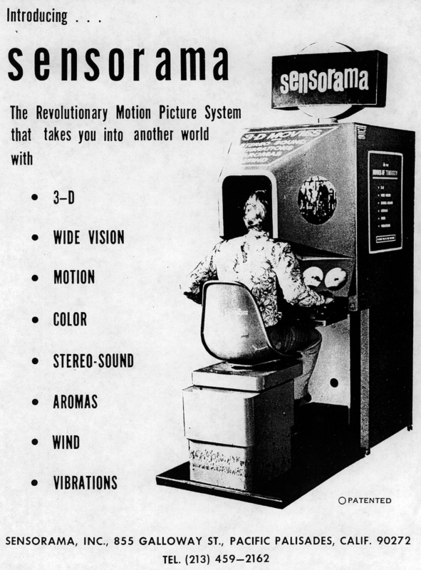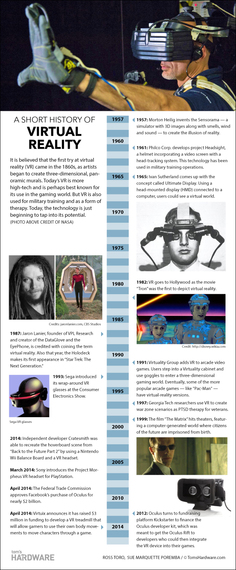We've been promised the Holodeck ever since we saw it in Star Trek in the late 1980s.
The first use of a "holodeck" by that name in the Star Trek universe was in the pilot episode of Star Trek: The Next Generation, "Encounter at Farpoint", although a functionally identical 'recreation room' appeared in the Star Trek: the animated series episode "The Practical Joker" in 1974.
The Holodeck was the ultimate escapism place for the crew of the Starship Enterprise, who was cooped inside a spaceship on their continuing mission. There they could experience nature, other planets, other times and role play as a means to keep playfulness and sanity within their stressful work environment (having the ship and crew go through another trope cliffhanger on a weekly basis, was definitely a stressful job).
The Wachowski's Matrix brought another side of the Holodeck to mind -- the holodeck of your mind: prison of your mind, the one you can never escape:
Morpheus: Have you ever had a dream, Neo, that you were so sure was real? What if you were unable to wake from that dream? How would you know the difference between the dream world and the real world?
The Matrix was the ultimate holodeck where the whole human existence was created, while the true reality was dark and abysmal -- a reality one would most certainly want to escape.
Virtual reality has been appearing in popular media for years and usually used to warn us of a world and a time where we we'd want to escape reality as it would have become too unbearable to face that we would rather spend our time in our virtual worlds.
In the book Ready Player One, such a world is described in detail -- a world collapsing while its inhabitants are jacked into the Oasis -- a virtual world.
[Morro] felt that the OASIS had evolved into something horrible. "It had become a self-imposed prison for humanity," he wrote. "A pleasant place for the world to hide from its problems while human civilization slowly collapses, primarily due to neglect. ― Ernest Cline, Ready Player One
Are these truly probabilities of our future in virtual and augmented worlds?
Virtual Reality and Augmented Reality have been making strides in the past recent year, thanks to the exponential growth and development of technology.
Virtual Reality with its promise of simulated virtual worlds or 360-degrees view of actual recorded experiences has been gaining traction with the advent of headsets such as Oculus Rift, which was purchased by Facebook for a whopping $2 billion, Project Morpheus by Sony and now the new comer from HTC VR, along with many more arriving soon into a holodeck near you.
Augmented Reality, which creates an augmented layer on top of the real world is ramping up as well with some interesting tech from the likes of Microsoft's Hololens and its promise to transform your life with holograms and Magic Leap -- which Google ventures have heavily invested in.
It seems that wherever you turn these days -- someone is developing some interesting experience, game, technology, that is moving us ever closer to the holodeck.
We've been trying to build a virtual, immersive experience for a long time:
The first concepts of Virtual Reality came as early as 1957 with morton heilig's sensorama:
The first attempts were very crude but we have pressed on and continued to evolve, develop and invent new ways of creating virtual worlds -- here is a brief timeline, courtesy of website: tomshardware.com :
A fully functioning Holodeck seems to be nearer than ever, and in the coming years we will be experiencing more and more of these worlds in a much more vivid way.
A lot of philosophical and existential questions are arising from the emergence of these technologies.
One big question is: are our memories and feelings that are experienced in virtual worlds, actually real?
People have experienced real emotions in Virtual Reality worlds, like the project Hunger in Los Angeles, where creator Nonny De La Pena centered an experience around a man who fell into a diabetic coma while waiting in a food bank line, an event witnessed and recorded by her team. Viewing the experience on a VR headset "One person tried to bend down and cradle the man's head in his arms," she says. "It felt so real in that moment that they just had to act."
Our brains cannot decipher what is real or not -- like when we cry in a film -- even if our cerebellum knows this is not real, our emotions go through the motions, so to speak of feelings.
So by creating more scenarios like this one, can we raise more empathy in us towards the people in these scenarios?
Could this be used as a tool for us creating a better society?
Will virtual reality let us experience life from another's eyes so we can see things from the other's perspective?
Will that finally teach us, that we are all the same and perhaps helps us be kinder to each other?
I sure hope so.
Or are we going to use these technologies for more mundane things like pornography and leading armies into battle in our favorite fantasy worlds? That could be still extremely entertaining, but in the end, just a novelty.
One of the biggest questions that arise, is why we are seeking these experiences? always wanting to create other worlds that are not real but made up? Is that what makes us human?
Always seeking the truth about reality?
Always wanting to create imaginary worlds, virtual worlds where our fantasies can roam free.
Is this part of a God complex we all share -- creating worlds?
Do we secretly wish to create our version of the holodeck where all of our dreams come true and we have full control over every aspect of it?
Whatever the reason is -- we should be weary that the technology is evolving in great speed and for us, as a species, there is a need to level up, or might I say: upgrade.
The big question is what will happen in our future:
Are we all going to escape reality to live in virtual worlds, letting go of this existence because the reality could become too unbearable; or can we create a future and a reality that is so thriving, exciting, enticing and beautiful on a flourishing, regenerative, and beautiful planetary ecosystem -- a place beyond our wildest dreams but that is real as can be.
The answer is up to us and the time to decide is now...




